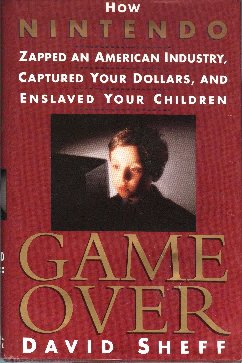 Game Over: How Nintendo Zapped an American Industry,
Captured Your Dollars, and Enslaved Your Children
Game Over: How Nintendo Zapped an American Industry,
Captured Your Dollars, and Enslaved Your ChildrenLength: 445 pages From: David Sheff/Random House, 1993 Game Over: How Nintendo Conquered the World (paperback version) Ad copy:"Game Over is a remarkable book about a remarkable company.. As Sheff reveals in this sobering expose, Nintendo is not content merely to have swallowed up the toy and electronic-game industries, but now has its sights set on the entertainment, consumer electronics, communications, and computer businesses." The truth: This was a somewhat popular book, and you should still be able to find or order the paperback version at your local bookstore. It's an excellent reference work and history of Nintendo, but it does have its drawbacks. For one, Sheff obviously is writing to a different audience than us NES freaks. He seems to be going for the "concerned parents and congressmen" demographic with his writing, which is full of huge statistics on NOA's amazing power ($500 million profits in 1992, usage of 3 percent of all semiconductors made in Japan), semi-threatening quotes from NOA chief executive officer Howard Lincoln about how he'll crush all non-licensed companies to the ground and how Nintendo's new computer network will take over the world, and so on. In fact, very few people that figure in the book are painted in bright colors. Nintendo Company Ltd. president Hiroshi Yamauchi is portrayed as a heavy-handed, domineering, micro-managing demon that happens to get results. Lincoln is cold as steel. Alexey Pazhitnov is the ultimate in idealists, hiking through forests and waxing philosophical about his game. To say the least, not a lot of effort was made to show the players in more than the broad "good/evil" perspective. The book includes a fair amount of info on the planned Nintendo Network, a system that would use the NES as a portal to services like stocks, online shopping, and the like. Although the USA plans never really got off to the ground (due to hardware problems and an embarassing rebuke from the state of Minnesota), Sheff portrays the coming network as the first step in Nintendo's domination of the entire electronics industry; in some places, you could substitute "Microsoft" for "Nintendo" in his text and it would not seem at all out of place. If you can get used to Sheff's writing style, though, you will discover an extremely entertaining overview of a time when Japanese companies could do no wrong and seemed to be taking over the world. Nearly everything from Nintendo's 19th century beginnings, its entrance to the game field in the 1970s, the seat-of-the-pants Donkey Kong days, the meteoric rise of the NES.. up until the introduction of the Super NES in 1992. The best thing about the book imo is the exhaustive presentation of the main lawsuits Nintendo were involved in, from Tetris to antitrust to Taiwan piracy. Although Sheff's predictions of Nintendo as Big Brother probably won't come true in today's game market, this book is still excellent reading and a must for any NES fan. (As a note: The "new afterword" in the paperback version is simply a five or six-page overview of the Mortal Kombat backlash of 1993, and it's not really worth that much more to get the paperback version just to read it.) Back... |